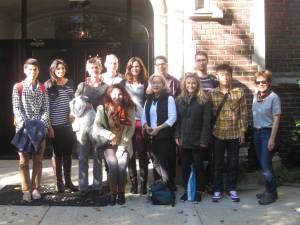(Written by ISH-DC Resident Josh Ettinger)
ISH-DC was privileged to have Dr. Thomas Schelling, a Nobel Prize winning economist, give a talk on February 18. Schelling is recognized for his significant contributions to game theory, which explores the dynamics of cooperation and conflict. He has also studied climate change for decades, long before it became a major point of discussion.
He began his remarks exposing a common but false analogy about climate change. The notion of “greenhouse gases” is deceptive because the gases causing global warming—predominantly Co2— do not affect the atmosphere in the same way a greenhouse stores heat. He described several experiments one can conduct in a sink, such as one using dry ice, that give a better idea of how heat is trapped in a space by Co2.
Schelling said climate change will most strongly impact agriculture, particularly food, fisheries, and forests. He gave an example of California’s imperial valley, which relies on snow-melt to replenish its crops. Yet when there is less snow and more rain, the water flows directly to the ocean without the consistency that the snow-melt provides for the crops. While many industries will be adversely impacted, he noted that some will benefit from the changing environmental conditions.
While climate change will most strongly impact agriculture, developing nations will be affected to a much greater extent than developed nations. An increasing global population, coupled with a larger middle class and improved living standards mean a greater demand for food. As food becomes more scarce due to climate change, the prices will only become higher. Countries like the U.S. have the resources to feed its poor, but developing countries do not. It will then become a major point of contention to what extent rich countries can help their poorer counterparts.
Schelling then discussed how rising sea levels will threaten coastal cities.
He noted that many American cities are not prepared whatsoever to deal with rising water levels. The planning phase alone for building infrastructure to handle rising sea levels can take many years. The melting of the Antarctic ice sheet could soon become unstoppable, if it isn’t already, so this could become a reality in the near future.
He concluded his remarks highlighting cutting edge geoengineering concepts to mitigate the threat of climate change. There are numerous proposed methods for removing Co2 from the air. However, he pointed out, these are currently very expensive. There are also proposals to add sulfur to the atmosphere, which some believe can block some sunlight.
In response to a question about the political challenges of climate change, Schelling responded that unfortunately, it might take a natural disaster at a scale much larger than experienced before to motivate politicians to action. When asked about the role of the United Nations (UN) in regard to climate change, he said that the UN needs to mobilize rich countries to take action on climate change, but emphasized that the United States must assume a leadership position.












